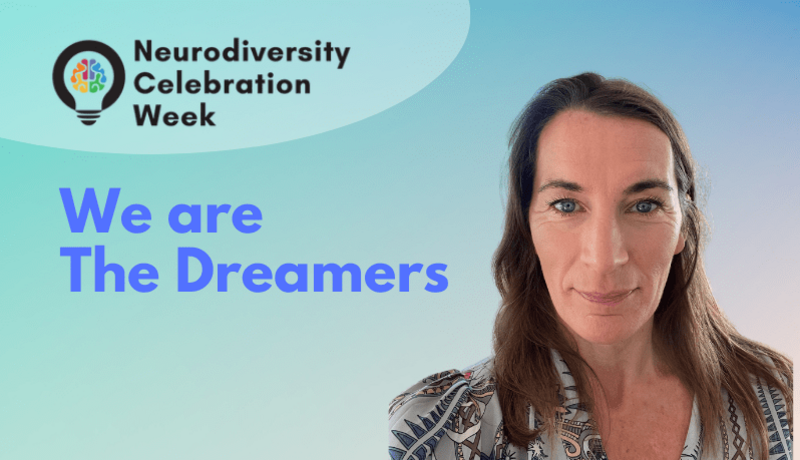Personal Perspective | Neurodiversity Celebration Week with Elly Hanna
Posted on March 2023

Non sequitur: a conclusion or statement that does not logically follow from the previous argument or statement.
This term was first introduced to me at GCSE English. At the time I thought, that’s kind of how my brain works, and as I progressed through education it became a defining mark of my work. Essays had the correct content but the journey to my conclusion often needed a map, as my writing would follow different tangents.
It was at A-level that I was referred for testing and my dyslexia was diagnosed. It was given the title of 'information processing disorder' and allowed me more time in my exams. This concession was helpful but ultimately the support I needed wasn’t there at the time, so I had to find my own strategies to order my output. I had to slow down, rein my brain in, really focus on staying on topic and proof, proof and proof again. These strategies I still use today, as well as surrounding myself with patient, brilliant and scrupulous proof-readers.
Since my diagnosis I’ve never really revisited it, I have just taken it as a cause for how I work, not a reason to limit myself. I truly enjoy the tangents my brain goes on; they enable me to think wider and dream bigger, and it is often there that my best creativity occurs. I also believe it’s an integral part in the evolution of my career and my ability to juggle life with just the occasional dropped ball.
Of course, it’s had its downsides; academically I peaked at GCSEs, which I’m sure is a direct reflection of the number of essays needed in further education, and it’s demoralising when I check something relentlessly and still an error slips in or I struggle to make my point cohesively.
In my personal life I relax on my strategies which means the people closest to me have learnt to translate my texts, my husband and bestie are fluent. I do relate to the irony that a Head of Communications can totally confuse a whole WhatsApp group, but I like to think it’s part of my charm.
I’ve had a long career at Venn Group and it’s a place where I have been able to put my neuro skills to good use. When reaching Associate Director level in sales, I was able to manage different teams in different sectors and stay across everything that was going on, because my brain ‘ticker tape’ - as I call it - would refresh with every new event. It was within this role that I started working on various communications projects and I realised this field was somewhere I could thrive; it doesn’t stay still, you need to think differently, and my brain loves the ever-changing trajectory. The fact that industries are now recognising the power of neurodiverse brains is brilliant, as they add breadth of thought and bring skills unique to their diagnosis. Every brain is different and by using, understanding and celebrating this, companies and individuals will flourish. If you had a job that required a lot of access to the top shelf, you’d hire the tallest candidate; if you have a job that requires acute pattern recognition or creativity, hire a dyslexic.
Recent Articles
-
Flipping the Script on Islamophobia | Personal perspective | Nadia Muzaffar
Conversation is a powerful tool. Even a two-minute chat can change a perception, correct a misco...
13 days ago -
Pancreatic Cancer Awareness Month | Personal Perspective | Louise Francis
This year, our Birmingham office chose to fundraise for Pancreatic Cancer UK in support of my br...
20 days ago -
Personal Perspective| Islamophobia Awareness Month with Safiyyah Ayaz
For Islamophobia Awareness Month, we are honoured to feature passionate employees who have chosen...
about 1 month ago